Black Widow Spoiler-Free Review: A Waste Of Recycled Potential
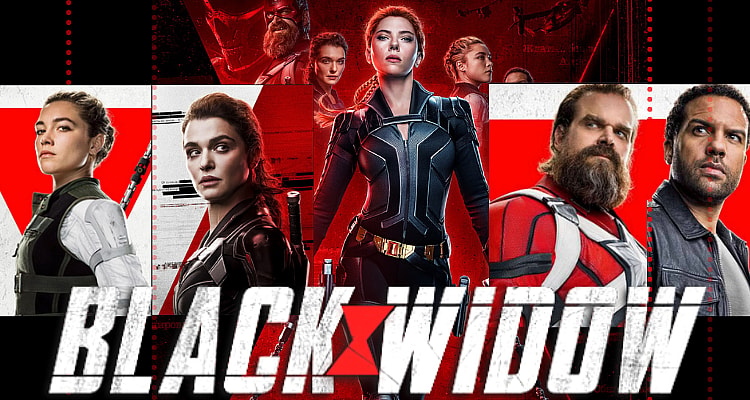
Before I get into my spoiler-free review of Marvel’s latest release, I’d like to preface my thoughts by explaining my mentality when it comes to watching movies.
When I go see a film, I try to give it a fair shake, regardless of how I may feel about its advertising campaign, the access media hype surrounding it, or the narrative it’s trying to push. To that end, I attempt to judge movies solely on the pure entertainment value I got from them.

Advertising an Agenda
This is relevant because, unsurprisingly, Black Widow was at the center of such a circus. For example, in IndieWire’s review of Black WIdow, writer Eric Kohn praised how the film not only passed the arbitrary Bechdel test, but did so to the extent that it would allegedly make “men to squeam as it puts them in their place“.
There was also star Scarlett Johansson’s ‘apology tour’, in which she expressed regret at how her character was portrayed in previous MCU films, claiming that the super-spy had been depicted in the past as nothing more than a “sexist stereotype,” during numerous Black Widow related interviews and media appearances. Then, of course, there was Kevin Feige’s insistence that the film would subvert expectations.
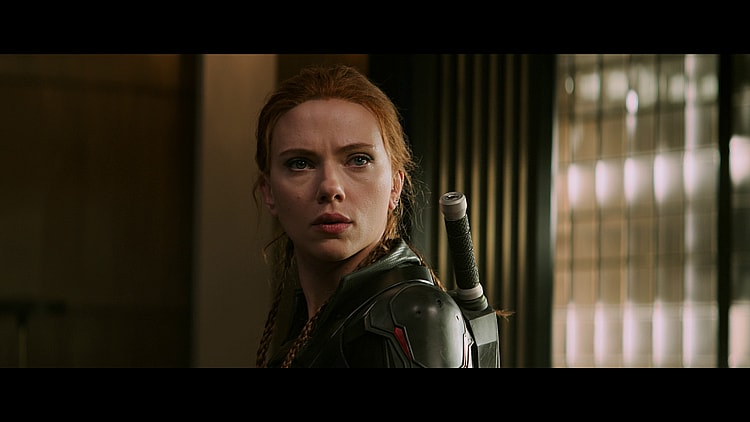
It even seemed like media outlets have been going out of their way to praise Black Widow, throwing out every virtue signal they can to make it sound like the film set some sort of feminist standard for all films going forward, with early reviews widely hailing the writing, direction, opening sales numbers, and nearly every single creative entity involved with the film
Well, spoilers: It’s just an okay film.
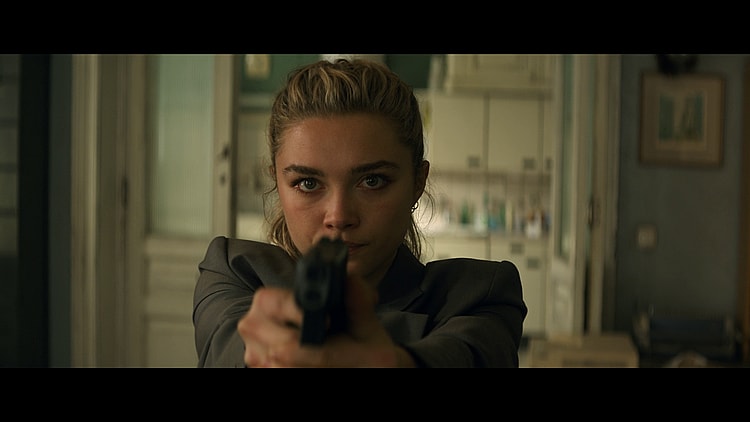
Set in between Captain America: Civil War and Avengers: Infinity War, Marvel’s Black Widow follows the titular spy/hero, Natasha Romanov, during her time on the run from Sokovia Accord-enforcing government authorities.
However, when an old nemesis emerges from the shadows and Natasha comes to find herself in posession of a mysterious package containing a key to her past in the infamous Red Room, the Avenger resolves to amend the mistakes of her youth and destroy the same program that made her and countless other young girls into the same type of ‘villain’ she was as seen as by the world at large prior to the Battle of New York.

Without getting too detailed about what goes on in the movie, Black Widow takes certain story elements introduced in earlier Marvel films – a strategy which has worked well for the studio in the past – and combines them with a darker tone and topics to create a more spy-themed entry into the MCU.
Of course, this ‘darker tone’ only extends to a certain point, because as controversial as the story’s subject matter might be, it’s still a Marvel film, and at the end of the day it still has to appeal to broader audiences to some degree.

A Mixed Bag of…’Just Okay’
Black Widow’s identity is composed of conflicting genres – so much so that the film’s attempts to mix them are outright laughable in their execution – especially regarding the third act.
While the film does well by some of its characters, particularly Florence Pugh’s Yelena Belova and David Harbour’s Red Guardian, Scarlett Johansson and Rachel Weisz were flat in their performances as Black Widow and Melina Vostokoff, respectively.
Notably, Harbour carries himself with a sense of humor and gravitas in his performance as Red Guardian, balancing scenes wherein he experiences both difficult and moments of clarity in his attempts to reconnect with his estranged “daughters”, Natasha and Yelena.

Sadly, the film’s sudden action scenes, as well as its ‘standard Marvel’ script, lead Harbour’s character to shy away from truly deep, next-level character moments.
The same occurs with Pugh’s Yelena. It feels like the script had specific moments where it could have really taken these characters in a different direction – much different than the one Marvel movies usually take – but someone at Marvel stopped it from doing so because there’s a “formula to follow”. Thanks to this gumming of what really works in the film, the emotional resonance during Black Widow’s really heavy parts is glazed over with impact-lessening dialogue choices and delivery.
For example, there’s a certain scene where the characters discuss trauma and genital mutilation, but it’s given with such a lighthearted delivery that the audience doesn’t have a moment to reflect on the issues and emotions a character who experienced such violence might experience. And in the end its not really approached again.

Having said that, Harbour’s prison break scene is a very enjoyable part of the film. Filled with action and over-the-top battles but grounded in the reality of what a slightly super-soldier enhanced human would likely face when being held in a maximum security facility, Red Guardian’s feats during his breakout managed to impress me to the point where I began to think he probably could go blow-for-blow with Captain America.

A Mediocre Black Widow and Mother-Figure
As for Johansson, she does well enough playing an aloof spy character serving on a defunct team of superheroes, but it’s her scenes with Pugh that really show a difference in the execution and delivery of the two actresses’ respective performances.
While Pugh manages to put a swagger into the personality of the Russian spy/assassin, Johansson compartively feels monotone with her lines, and thus fails her dialogue fails to connect on the same level as her co-stars (in fact, there’s actually a moment during the third act of the film when Johansson’s delivery during her confrontation with the ‘big bad’ managed to take me out of the film).

The same can be said of Rachel Weisz’s Melina Vostokoff, as seen during a one-on-one scene with Johansson wherein the dialogue between them just never hit the emotional point that the writers might’ve been going for.
Heck, before being conveniently interrupted by an incoming threat, Harbour and Pugh got more emotion out of their one-on-one scene than Johansson and Weisz did in theirs.

When something spectacular happens on screen, whether it be a stellar performance, a highly-energized action scene, or a breathtaking/striking aesthetic of imagery, one can normally suspend their disbelief to accept the more non-realistic moments of a movie.
Yet, the film’s third act is so horribly written and filmed, doing a massive disservice to every character involved, that it almost complete destroys the goodwill found in Harbour and Pugh’s earlier performances.

Terribly Written Villains
Meanwhile, the villains of the film, namely Taskmaster and the one behind the scenes pulling the strings of the Red Room, are easily forgotten.
There’s an agenda behind this film, to be sure, but though writer Jac Shaeffer previously revealed such agendas during promotional interviews for Black Widow, the film’s release has allowed us to see it on full display, as the production’s male characters are depicted as nothing more than ancillary comedic buffoons or straight-up villains with whom the audience never really gets a chance to connect with.
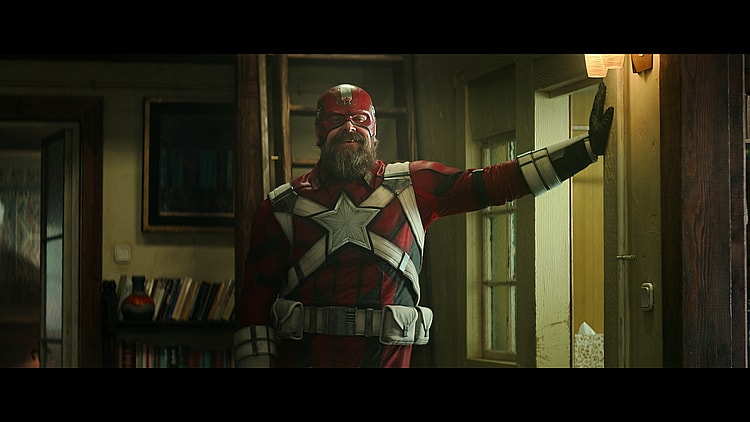
Similar to what we saw in WandaVision (slight spoiler), Black Widow once again features a white male in charge of a clandestine organization whosework threatens to destablize governments and power structures around the world, though the use of the Red Room and a cadre of Black Widows rather than ‘Sentient Weapons’.
This individual also has at their command the mysterious character known only as Taskmaster, but (once again) slight spoilers: it’s not the comic book version, but rather a gender swap whose ‘reveal’ is pretty much spelled out for the audience from the first act. She also has nothing to say for most of the film, murmurming only a single a line during the finale.

Her action scenes are also inconsistent.
In one scene, Taskmaster is wiping the floor with Red Guardian – the same Red Guardian who was previously seen kicking down vaulted doors and jumping higher than any human naturally can during his prison break – despite being only able to mimic the actions of others on a ‘movement’ level, as seen during an earlier encounter between Natasha and the latter.
Yet, in the final battle scene, she is sparring on level playing field with Romanoff, all while diving through the air and sliding across various pieces of falling debris.
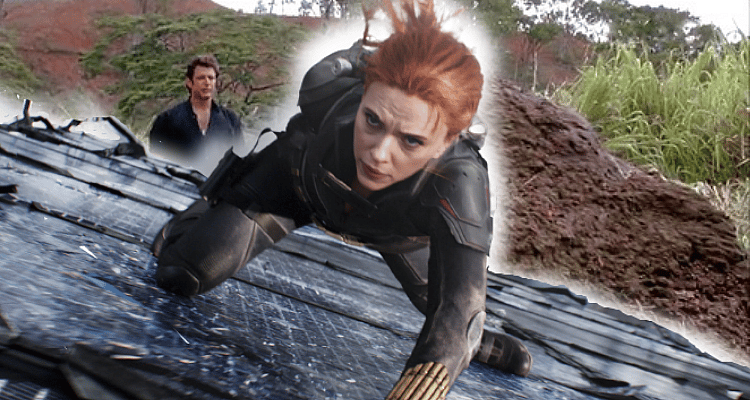
The Marvel CGI Third Act Circus
It always comes down to the spectacle of the third act with Marvel films, as the studio puts a majority of its funding towards huge set pieces that pit the hero against the villain.
More often than not, it’s a cacophony of explosions and fisticuffs that attempts its utmost to dazzle audiences, but ultimately ends up being more flawed than flawless, exposing the film’s storytelling weaknesses and highlighting many points where the narrative falls flat.
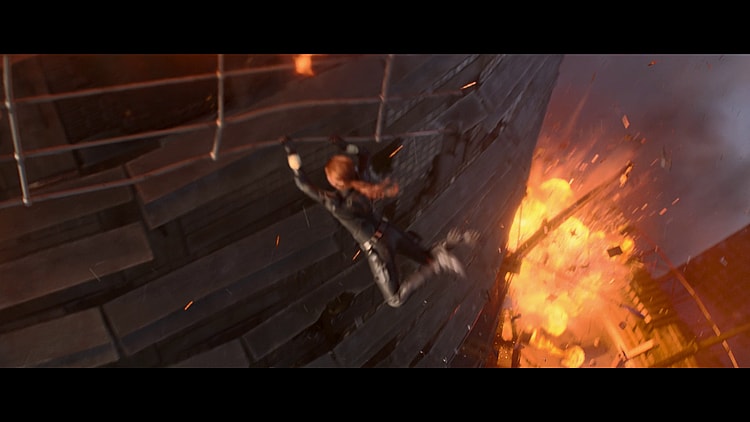
Black Widow is no exception.
I touched above on how the direction of the film’s third act ruined the performances of two actors who I thought were some of the story’s stronger characters, but it should also be mentioned that Black Widow’s finale not only exposed the flaws in Johansson’s acting and the writing for her character, but also really showcased the magnitude of Marvel’s inability to write a well-rounded villain.

Part of me thinks the third act suffers from an inherent incompatibility between the spy- and superhero- storytelling, as while the former seeks to be a bit more grounded, the latter presents idealized hyperbole of action adventure.
As an example, think about Jason Bourne, a character whose strength is his ability to hide away in the shadows and use espionage and murder to reach his personal goals, and then compare him to Superman, a character who works in the light of day for all to see and encapsulates the better aspects of us all – humanity embodied in a man.

I’m not saying that a story told with these two things at play can’t work, just that it didn’t work in Black Widow, as the character would be better served in a more grounded and personal Natasha Romanoff story inspired by the former rather than the latter.
Also, every Marvel film doesn’t need world-ending stakes at play to create tension. I know going big is an almost self-imposed requirement for Marvel at this pooint, but it more-often-than-not just takes away from a given film’s potential.
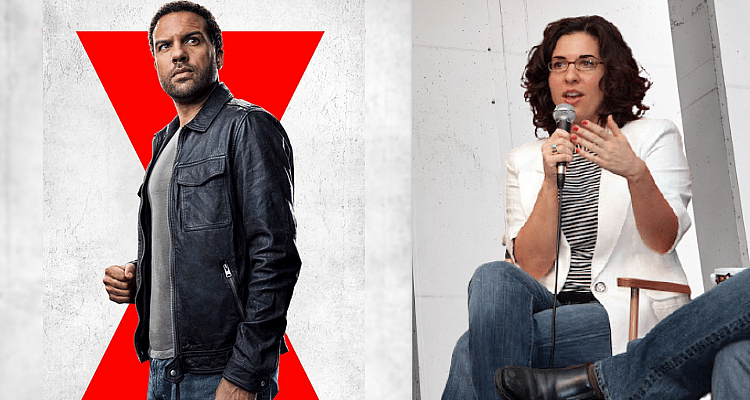
Throwaway Characters/Plot Points
As for O.T. Fagbenle, though he appears on-screen as equipment broker Rick Mason, showing up for two of threes and sporting his poster appearance of a jacket, t-shirt and jeans, he serves absolutely no purpose in the film.
In fact, given how it feels like everything he secured for Black Widow could have easily been secured by the Avenger herself, especially in light of her many years of being a covert black ops agent, his character is so disconnected with all of the events depicted in the film that he didn’t even really need to be in the movie.
His role was so insignificant to everything going on that I don’t even remember if his character had a name (even my editor had to look up his name in order to identify him above).
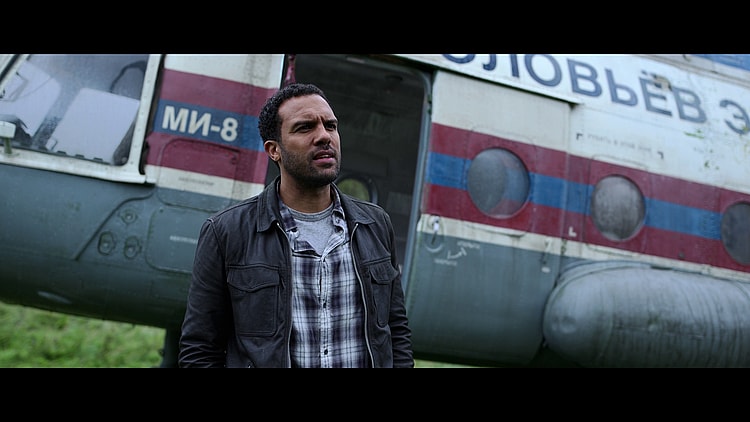
There were even plot points in the film which, in light of events that immediately followed, ended up being just as insignificant to the film as Mason’s character.
At one point, certain characters are unable to attack a villain because “reasons”, despite other characters who should’ve been prevented from taking action due to those same “reasons” being able to fight said villain without batting an eye. Later, a the network of little girls who were abducted to serve in the Red Room is immediately forgotten about by the post-credits scene.
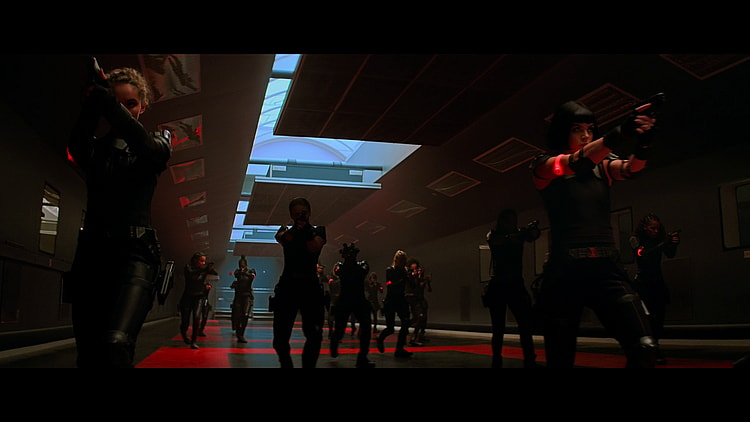
This is to say nothing of the inconsistencies in the difference between villain and hero strength levels and some characters’ motivations. Even the brief flashback to the shared history of Red Guardian, Vostokoff, Belova and Romanoff is a strange start to the story, as in and of itself, it’s not a well-developed origin story for how the four first came together.
While the pseudo-familial tie is meant to elict some sort of emotional response from the audience, it’s almost as easily as disregarded in the third act when all four just walk away each other, which makes it feels like they could have just as easily walked away from any connection to their past lives.
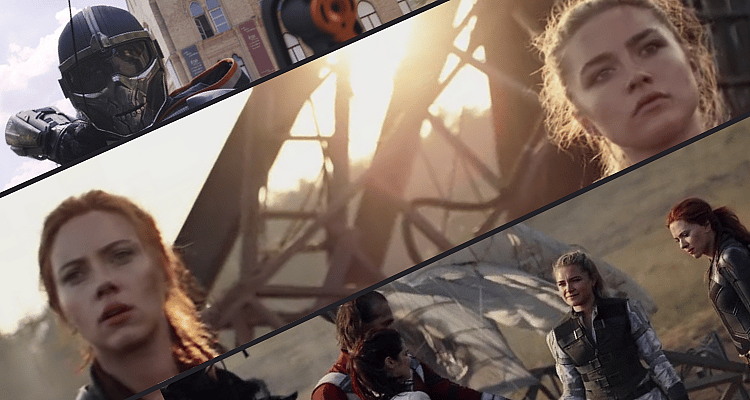
Nothing New Under the Sun
As I hinted at before, there Feige recently offered up the fact that the Black Widow film was developed in a way meant to subvert audience expectations.
Unfortunately, while there were moments in the film that weren’t told in a linear fashion, much of what did happen was just Captain America: The Winter Soldier on repeat, leaving Natasha’s solo outing feeling as if its plot points were jut copy-pasted from its predecessor.
Black Widow also features an appearance by a certain face-swap technique, first used in the Captain America: The Winter Soldier, with it being used in order to infiltrate the lair of the big bad. Yet, given that we’ve seen this move before, when it happens, it’s not a new trick. In fact, even the film’s final set piece is very reminiscent of the one seen in Captain America’s second film.

Heck, even Taskmaster, the masked villain fighter, turns out to not only be someone from Black Widow’s past, but also a red-herring to the identity of the ultimate, string-pulling big bad – just as Bucky was in Captain America: Winter Soldier.
So, in some regards, Black Widow is a ‘gender swapped’ Steve Rogers film. In others, it’s a passing of the torch to a younger Red Room graduate. It’s all recycled plot that was done by the studio’s previous attempt at a spy-thriller.

Conclusion to Black Widow
In the end, Black Widow falls flat.
Though certain tweaks to dialogue, story, character, etc., could’ve roped the audience in for genuine engagement, and there were parts of the film that felt like if it leaned more into the spy-genre it would’ve been an entertaining romp that could have taken Marvel films to the next level, the cultural importance on pushing agendas in contemporary media may have contributed to the film crashing before it ever had a chance to realize any of its interesting potential.
Black Widow is hardly a notable sendoff for the character, but rather stands as more of a jumbled mess of side-quest storytelling, where even the acting of the film’s star is bland compared to her supposed successor.
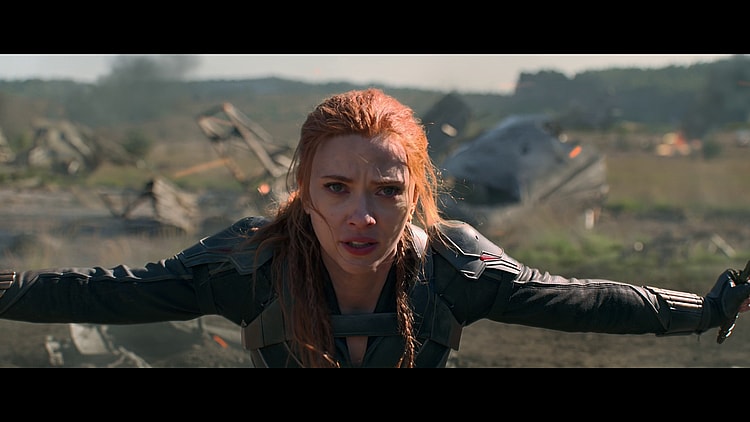
An argument can be made for whether or not a trip to the theater is a worthy payoff to the years of waiting for Natasha Romanoff to receive her own solo film. However, I don’t believe Black Widow is worth forking over $30 for a Disney Plus VOD.
What did you make of Black Widow? Let us know your thoughts on social media or in the comments down below!
